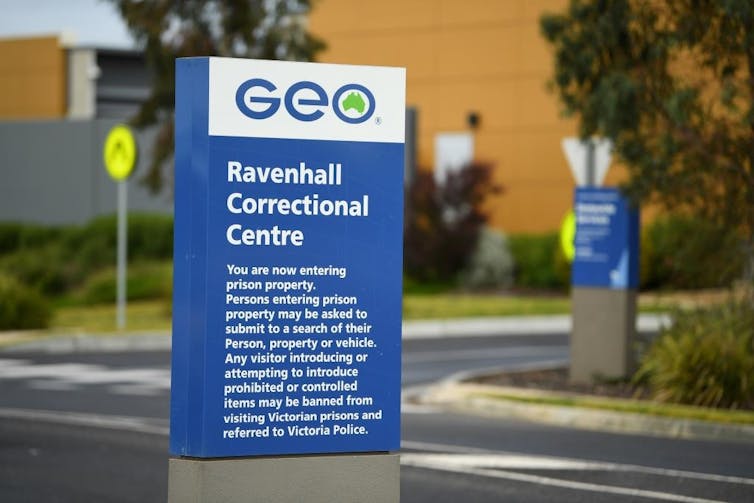Why prisons in Victoria are locked up and locked down
- Written by Lesley Russell, Adjunct Associate Professor, Menzies Centre for Health Policy, University of Sydney
This week revealed cases of coronavirus infection in a Victorian prison guard and a prisoner in quarantine on remand. Now six Victorian prisons are in lockdown.
This is not the first time there has been a positive COVID-19 test for prison personnel in Australia; three justice health staff in New South Wales tested positive earlier this year.
Public health and prison officials look fearfully at the toll coronavirus has taken on incarcerated populations around the world. They recognise Australian prisons are also at high risk for coronavirus outbreaks.
Many have pushed for proactive measures to prevent this. Now the adequacy of the implemented measures is being tested.
Read more: Coronavirus: why prison conditions can be a perfect storm for spreading disease
Why are prisons and prisoners at increased risk?
Prisons and prisoners are at increased risk of coronavirus for many reasons, including:
Prisoners and staff (who come and go into the community) are in close contact. So it is easy to see how transmission could occur between the community and prison populations, and back again.
Overcrowding means prisoners cannot self-isolate.
Hygiene standards are poor and there have been reported shortages of personal protective equipment (PPE) for both staff and prisoners. National Cabinet agreed in May supplying PPE to corrections facilities should be a priority “if COVID-19 cases are confirmed in the sector”, so it is not clear if this has happened.
Prisoners have higher rates of social disadvantage and many are medically vulnerable due to lifelong difficulties accessing health care; mental health and substance abuse problems; violence; and unhealthy prison conditions.
Indigenous Australians are significantly over-represented in the prison population. While coronavirus has been kept out of Indigenous communities, there is every reason to believe Aboriginal and Torres Strait Islander people, like other First Nations people, are at increased risk from coronavirus infection and death.
There is significant churn in the justice system as people are taken into custody, bailed, jailed and released.
There is little data to assess the adequacy of health-care facilities in prisons. But prisoners have an inherent health-care disadvantage as they cannot make their own decisions about their health care, or access Medicare and medicines under the Pharmaceutical Benefits Scheme.
What’s happening in prisons during the pandemic?
There is little information about what is happening to protect Australian prisons from the pandemic.
One media report in March outlined some measures individual states and territories have taken. All jurisdictions have limited prison visits and most, including Victoria, have instituted a 14-day quarantine for new prisoners.
There has been some testing in some prisons, but the extent is not known. A media report in May stated Victoria would increase testing in prisons after three inmates returned inconclusive tests that were later found to be negative.
 Ravenhall Correctional Centre in Melbourne is one of six prisons in Victoria in lockdown this week.
James Ross/AAP Image
Ravenhall Correctional Centre in Melbourne is one of six prisons in Victoria in lockdown this week.
James Ross/AAP Image
Should we be releasing prisoners?
Australian governments have faced renewed calls to urgently release some prisoners into the community. This would cut the number of people held in prisons and other places of detention, particularly Indigenous people and others at increased risk.
Governments in some states, have responded by introducing legislation to allow for this, although we don’t yet know the extent of any releases.
However, release into the community is only a safe option if people have appropriate housing and support services. There are concerns that releases — which are based on risk to the community, the safety of victims and access to accommodation — will be culturally biased against those most likely to benefit such as Indigenous prisoners.
Many Indigenous communities are closed to visitors and no-one can return until after a 14-day isolation period. This presents difficulties for those prisoners who do not have accommodation options outside their communities.
We need to avoid what’s happening overseas
The clear lessons from the second outbreak of coronavirus in Victoria and from the disastrous situation of rising coronavirus cases in prisons in the United States is that swift, concerted actions are needed to curtail spread of the virus.
The only way to know what is happening is rapid testing of prisoners and staff, whether or not they show symptoms, and effective isolation of anyone possibly infected.
At the same time, the human rights of this vulnerable population must be protected and their physical and mental health needs addressed. Already most prisoners are unable to have visitors and in Victoria they are unable to receive needed supplies such as toiletries, books, food and clothing.
Families are reportedly “sick with worry” they will not be notified if a family member falls ill.
The UN High Commissioner for Human Rights Michelle Bachelet said that during a global pandemic, the consequences of neglecting the prison population was “potentially catastrophic”.
Read more: Coronavirus: a history of pandemics in prison
In Australia, Hannah McGlade, academic, human rights lawyer and a member of the UN Permanent Forum for Indigenous Issues, said:
Prison is the most unsafe place that Aboriginal people can be in a pandemic.
The Victorian government is already on notice. A recent decision of the Victorian supreme court found it had breached its duty to take reasonable care for the health of people behind bars during the coronavirus pandemic.
It is imperative that in the days ahead coronavirus infections in prisons and other correctional facilities are accepted as a public health problem for everyone.
Authors: Lesley Russell, Adjunct Associate Professor, Menzies Centre for Health Policy, University of Sydney
Read more https://theconversation.com/why-prisons-in-victoria-are-locked-up-and-locked-down-143178





